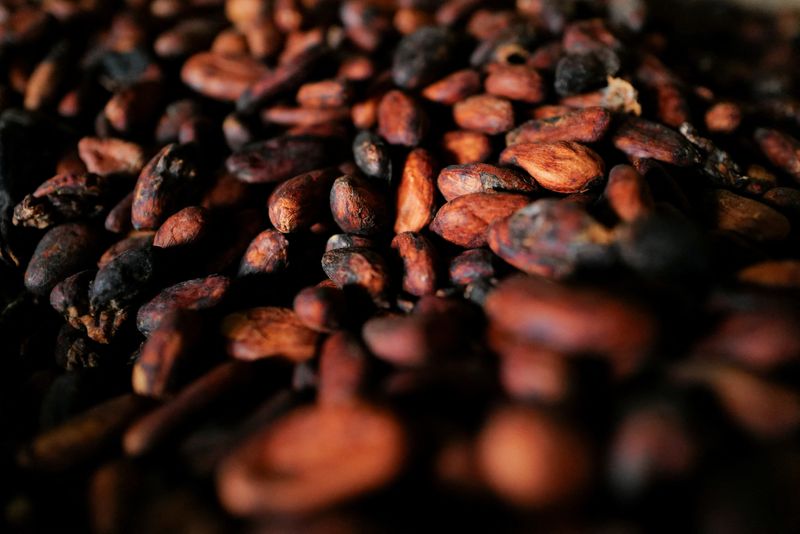What are cocoa futures, and how do they work?
LONDON (Reuters) - Futures markets have seen a record-breaking run in cocoa prices in 2024, a surge exacerbated by the hedge funds that provide much of their liquidity heading for the exit.
Here are some facts on futures markets, including how they operate and the main players.
COCOA FUTURES - THEY'RE DIFFERENT TO COCOA BEANS?
Cocoa beans are the vital ingredient in chocolate. The world's cocoa – harvested from the Theobroma cacao tree, native to the Amazon (NASDAQ:AMZN ) rainforest - is now mostly produced in West African countries, principally Ghana and Ivory Coast, and in Latin America.
Many of the world's cocoa beans are bought by large trade houses like Cargill, Olam and Barry Callebaut, which is also a chocolate maker.
In Ghana and Ivory Coast, the top two producers, these trading houses pre-buy beans via government contracts ahead of the growing season, with the crop then delivered during the October-to-September growing season.
Some traders also process beans into powder, butter and liquor that is used in products from chocolate bars to face cream, and then sell these to chocolate makers.
SO HOW DO FUTURES FIT IN?
Futures markets play a central role in determining industry-wide prices of commodities. They allow investors to buy and sell contracts to deliver anything from oil and pork to gold and cocoa, at a specified date and price in the future.
The market is also used by buyers of the physical commodity – in the case of cocoa that's the traders and food producers - to manage risk.
Think of a trader who puts in an order for cocoa beans at a certain price, expecting to sell them or related products at a higher price in the future - a so-called "long" position. They need to protect themselves against the risk that prices drop by the time they receive them and they cannot sell at the price they had expected.
Traders balance out their exposure by taking short positions in the futures market, in effect betting that prices will fall.
Cocoa futures markets are significant. They dictate the prices of physical beans, in turn influencing the price of chocolate bought by consumers, the revenues of cocoa producing nations, and the income received by farmers.
WHO ELSE CAN GET INVOLVED?
Speculators like hedge funds also trade futures. They don't typically touch cocoa beans, but instead try to make money off the rising and falling value of the commodity in financial markets.
Some hedge funds use intelligence, like weather data, to work out how supply will cause prices of beans to rise and fall, and make bets accordingly. Others use algorithms and trading systems to determine how risky the market is, and how many bets to take.
Hedge funds seek to avoid holding futures contracts to their expiration. That's because when the contract expires it is settled with physical delivery - cocoa beans would be delivered to the fund's doorstep.
WHAT HAPPENED TO FUTURES MARKETS THIS YEAR?
Cocoa supplies hit an historic low last year. Adverse weather and disease that hit trees in West Africa crippled production. The industry was already struggling with sector mismanagement, smuggling, higher production costs and illegal gold mining.
With lower supply of physical beans, prices climbed to historical highs on futures markets. Hedge funds and other speculators began to exit the market, booking profits and avoiding the growing risk from price swings.
Ghana, following its disastrous 2023/24 harvest, delayed bean deliveries by a year - the diminished supply increased prices further.
Over the past decade, the cash hedge funds and other speculators had pumped into the market had made it easier for cocoa traders to buy and sell futures contracts.
As hedge funds withdrew from futures in the first five months of this year, liquidity in the market fell, in turn stoking price swings and adding fuel to soaring prices.
On Wednesday, New York cocoa futures prices hit a new record.
Source: Investing.com
